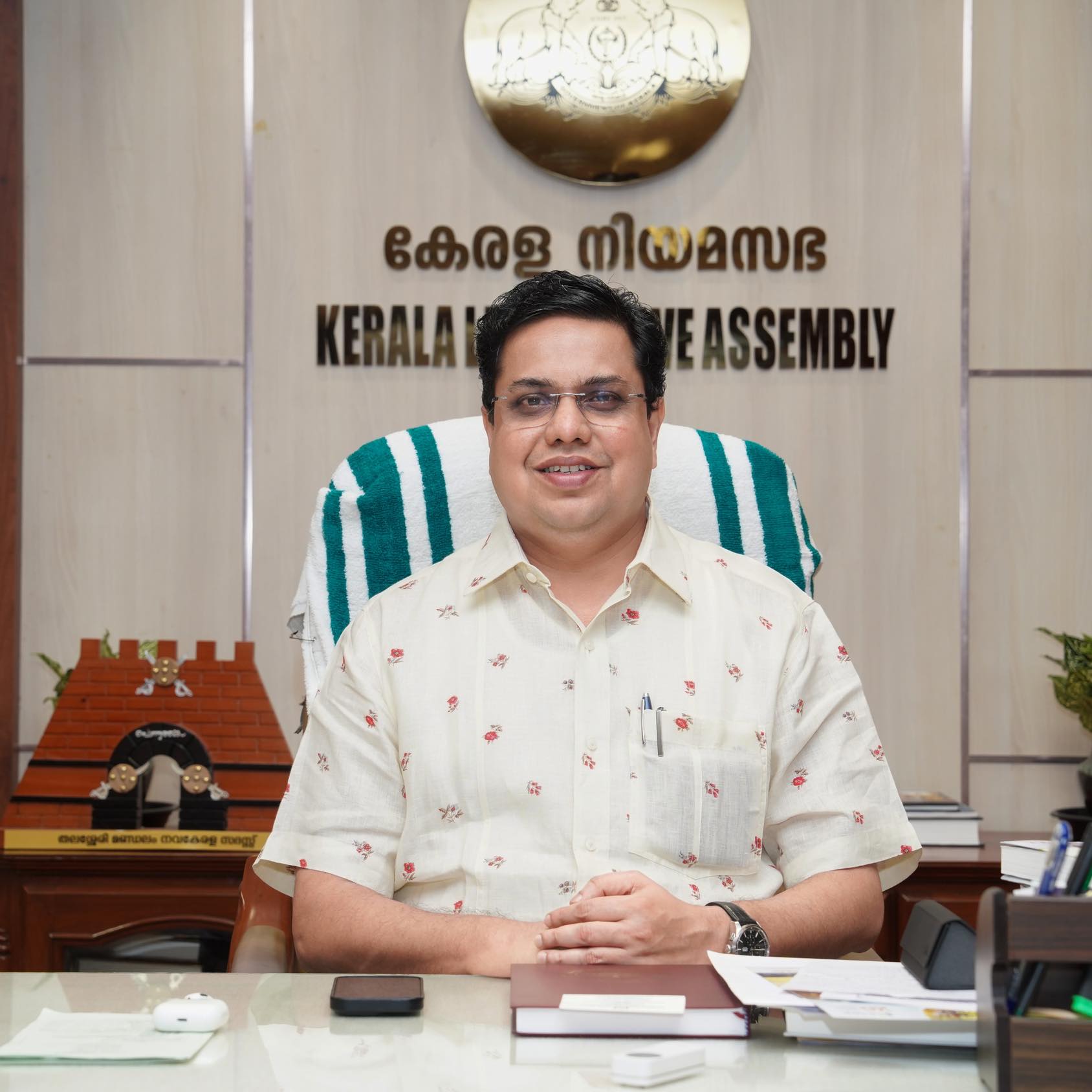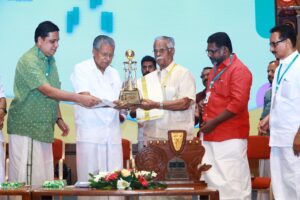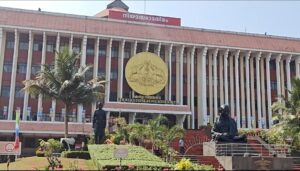Published Jan 08, 2025 | 9:00 AM ⚊ Updated Jan 09, 2025 | 11:11 AM

Speaker A N Shamseer
In an exclusive conversation with South First, Kerala Legislative Assembly Speaker AN Shamseer elaborates on the vision behind the Kerala Legislature International Book Festival (KLIBF), its growth, and impact on the literary world, positioning it as a platform for resistance in the age of misinformation.
The Speaker also offers insightful takes on the pressing issues of federalism, the controversial “One Nation, One Election” proposal, and the challenges of maintaining impartiality in a politically charged atmosphere.
His reflections underscore the importance of strengthening constitutional literacy and engaging the younger generation in the democratic process.
Shamseer also emphasises the Assembly’s commitment to a paperless future. Excerpts:
Q: What inspired the Kerala Legislative Assembly, known for its trailblazing initiatives since 1957, to venture into the world of literature with the KLIBF, now gearing up for its third edition?
A: The idea was born out of a brainstorming session to mark the centenary of the Kerala Legislative Assembly Library, a historic institution that began its journey in 1921. Initially established as the Travancore Assembly Library, it evolved into the Travancore-Cochin Assembly Library in 1949 and later became the Kerala Legislative Assembly Library with the state’s formation in 1956.
In celebrating 100 years of this repository of knowledge, the thought of hosting an international book festival emerged—a vision that culminated in the Kerala Legislature International Book Festival.
The inaugural edition of KLIBF took place from 9 to 15 January 2023, followed by the second edition from 1 to 7 November 2023. Now, the much-anticipated third edition is scheduled for 7 to 13 January 2025.
To make the festival impactful and relevant, the organizers introduced the compelling slogan “Reading is an Addiction” (Vayanayanu Lahari). This slogan was designed to resonate particularly with younger generations, urging them to embrace the positive addiction of reading while addressing critical societal issues like drug and digital addictions. Given the Assembly’s serious discussions on drug abuse, including adjournment motions, the festival became a creative solution to promote reading as a healthier and transformative habit.
The initiative has struck a chord with people across Kerala. It has received overwhelming support from the public and their elected representatives, with MLAs cutting across party lines uniting to make it a success. As a result, KLIBF has seamlessly integrated into Kerala’s vibrant literary culture, proving that books can inspire communities and legislative bodies alike.
Q: Was the decision to continue KLIBF made after the success of the first edition, or was it always part of the plan?
A: From the very beginning, we envisioned KLIBF as a continuous and evolving initiative, not a one-time event. This vision was so clear that during the valedictory function of the inaugural edition, presided over by former chief minister Oommen Chandy, we unveiled the logo for the second edition.
So, the decision to continue wasn’t based solely on the success of the first edition—it was always in the plan.

T Padmanabhan being presented with the Kerala Niyamasabha Library Award for his overall contribution to Malayalam Literature during KLIBF-1
We have aimed to establish KLIBF as a recurring cultural phenomenon, akin to international book fairs like the Frankfurt Book Fair or national events like the Jaipur Literature Festival. We aspire to make KLIBF one of the most prominent book festivals in South India.
The numbers tell an inspiring story of growth. In the first edition, book sales totaled ₹7 crore, and in the second edition, this figure climbed to ₹10 crore. To ensure the sustainability of such sales, the Assembly, with state government support, allows MLAs to utilize ₹3 lakh from their Special Development Fund to purchase books for schools or libraries in their constituencies.
Additionally, we’ve leveraged CSR initiatives to maintain an average book sale of ₹8 crore across editions. This is a unique achievement unmatched by most book festivals.
The third edition promises to be even grander, with over 160 publishers and 250 book stalls (compared to 124 stalls and 88 publishers in the first edition, and 258 stalls and 158 publishers in the second). It’s set to be not just a book fest but a literary and cultural extravaganza.
Q: The Kerala Legislative Assembly has set a unique model by organizing the Kerala Legislative International Book Festival (KLIBF), as no other legislative bodies in the country conduct such an event. Has this initiative sparked interest from other state assemblies?
A: Absolutely! The KLIBF has become a national talking point among Speakers and legislative bodies. Karnataka Legislative Assembly Speaker UT Khader Fareed recently reached out to inquire about the event, impressed by the way it is conducted.
Similarly, Uttar Pradesh Legislative Assembly Speaker Satish Mahana also showed keen interest in understanding the festival’s concept and execution.
In fact, whenever Speakers from other states visit Kerala, they often ask about the KLIBF.
We take pride in sharing the details of how we organize this one-of-a-kind book festival.
Q: KLIBF is now in its third edition. How do you analyse its growth so far? Earlier, you mentioned the vision of making KLIBF a platform for discussions at the international level. What activities are being planned to achieve this goal?
A: KLIBF’s primary goal is to bring people together and celebrate the joy of literature and culture. This year, we’ve lined up a diverse range of activities to enrich the experience.
The event features engaging talk shows and thought-provoking debates with renowned authors, intellectuals, and other notable personalities. Alongside these, we are hosting vibrant cultural programmes to make the festival a holistic celebration of creativity.
A key focus for us is encouraging children to develop a reading habit. We believe the teenage years are critical for fostering a love for books.
To achieve this, we’ve designed special programmes and announced attractive packages for young readers, ensuring they actively participate in KLIBF.
The overwhelming response from the public has been heartening.
There’s a growing sentiment among people that missing KLIBF would leave one feeling left out. This enthusiasm is evident, as attendees from across the state eagerly look forward to being part of the festival.
It’s more than an event now—it’s becoming a cultural movement!
Q: We are living in an era where false narratives often overshadow the truth, and efforts are being made to distort scientific and progressive ideas. In such a challenging post-truth world, where lies seem to travel faster than the truth, do you think KLIBF could serve as a platform for resistance against these troubling trends?
A: We are living in the post-truth era. It’s said that a lie can travel halfway around the world while the truth is still putting on its shoes. I’ve witnessed this firsthand through various experiences.
We could see that particularly in the cultural sphere, irrational and suspicious ideologies are being forcibly propagated. A collective movement should be there to counter this.
In this movement, we firmly believe that the Kerala Legislative Assembly should lead the charge, and KLIBF is an extension of that commitment.

Kerala Legislative Assembly
What we aim to achieve through KLIBF is not a claim to single-handedly solve these issues but to ignite a collective movement. This festival represents a counterforce, a voice of reason and intellectual resistance.
Through thought-provoking talk shows featuring renowned personalities—both national and international—and with established writers sharing their perspectives, we hope to foster meaningful dialogue and inspire critical thinking.
KLIBF is envisioned as a beacon of resistance in this age of misinformation and manipulation.
I am optimistic that KLIBF will offer fresh perspectives to the public, encouraging them to challenge false narratives and embrace rationality, thereby contributing to a larger cultural resistance.
Q: KLIBF is attracting national and international publishers, and in previous editions, prominent figures like 2022 Booker Prize winner Shehan Karunatilaka have participated. Do you think KLIBF is gaining recognition on the global stage?
A: Absolutely, KLIBF is making its mark internationally—there’s no doubt about that.
Our ultimate vision is to elevate KLIBF to the stature of global literary events like the Frankfurt Book Fair.
What makes KLIBF unique is its venue—the prestigious legislature complex.
On regular days, the public faces significant restrictions in accessing this high-security area.
However, during the festival, we’ve eased these limitations to ensure that common people can freely explore and enjoy the space.
This decision has sparked immense enthusiasm among attendees.
Many are visiting not just for the books but to experience the legislature complex like never before.
The overwhelming response to the first two editions has been phenomenal, and I’m confident the third edition will surpass expectations and draw an even bigger crowd.
Q: Non-BJP ruled states have frequently accused the Union Government of centralizing power, undermining the federal structure guaranteed by the Constitution. As a Speaker, how do you see the role of a legislature like the Kerala Assembly in safeguarding federalism and addressing these challenges?
A: Federalism is the cornerstone of our Constitution, and any move against it is a direct affront to the spirit of our democracy. The Constitution grants states their rightful powers, but the Union Government seems intent on curtailing them.
Look at Kerala — our financial autonomy is being eroded, with the Union Government withholding crucial financial support.
For instance, crores of rupees in GST dues remain unpaid. The Kerala Assembly has actively debated these issues multiple times. A glaring example is the Wayanad landslides.
Despite the devastating impact, the Union Government initially failed to classify it as a disaster of severe nature. The state had to resort to protests to compel them to act.
Anyone who visited Meppadi and witnessed the destruction would understand the magnitude of the disaster—and anyone with a heart would feel the pain of the affected people.
The Union Government’s increasing grip over states undermines federalism and violates the principles of fairness.
Q: As a Speaker, what’s your perspective on the idea of ‘One Nation, One Election’?
A: The concept of ‘One Nation, One Election’ stands in stark contrast to our Constitution and, more importantly, to the very essence of India. India isn’t just a nation—it’s an idea.
An idea that thrives on diversity: our myriad languages, religions, cultures, clothing, and traditions. This vibrant pluralism is what defines us.
In such a diverse and dynamic country, imposing a uniform election system is not only impractical but also goes against the grain of our democratic fabric.
Our Constitution, I believe, safeguards against such centralizing ideas.
Implementing One Nation, One Election would require a constitutional consensus, and I don’t think the current Union Government has the mandate to achieve it.
Let me be clear — any move in this direction will meet with large-scale resistance from across the spectrum.
Q: In parliamentary systems like the Rajya Sabha, or Lok Sabha, or State Assemblies, the Chair is expected to be impartial, regardless of their political affiliations. Recently, we witnessed a move to remove the Chairman of the Rajya Sabha, while in Kerala Assembly, the Opposition accused the Speaker of stifling their rights and lacking impartiality. Can the Chair remain impartial in a highly politically charged atmosphere?
A: “I have always believed in and practised impartiality. As Speaker, my role is to guide the House with neutrality, without any personal biases or vested interests. My actions so far have been in line with this principle.
The Opposition’s allegations are baseless and not worthy of serious consideration. I remain committed to performing my duties without favoritism, self-interest, or bias, and will continue to uphold the dignity and integrity of this esteemed institution.”
Q: There’s a growing concern that the younger generation is becoming disengaged with politics, as evidenced by the declining voter turnout. What do you think can be done to reverse this trend?
A: The key lies in strengthening Constitutional literacy. It’s crucial, especially in times when fundamental democratic principles are under threat.
What every citizen needs to understand is that voting is not just a right—it’s a responsibility. The right to voice one’s opinion and shape the future is what our Constitution guarantees us.
My message to everyone is clear: Step up and vote!
If we remain passive, we risk creating an apolitical society, and that could pose a serious threat to our democracy.
Q: One of the innovative ideas being discussed in the Kerala Assembly is the transition to a paperless system. What’s the current status of this initiative?
A: While strides have been made towards achieving a paperless Kerala Assembly, the journey is still unfolding. The challenge lies in the complexity of the Assembly’s structure, with its intricate systems that can’t simply be digitized overnight.
However, the wheels are in motion, and I am confident that with continued efforts, we will reach the goal of a fully paperless Assembly in the near future, without much delay.
(Edited by Majnu Babu).

